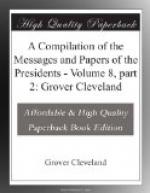Where a numerous body of citizens shall be united with the military in the procession, the whole of the troops will precede the bier, which will then be followed by the citizens.
When arrived near the place of interment, the procession will halt, the troops in front of the bier will form in line, and, opening their ranks, will face inwards, to admit the passage of the bier, which will then pass through the ranks, the troops leaning on their arms, reversed, while the bier passes. When the bier shall have passed, the troops will resume their position in line, and, reversing their arms, will remain leaning upon them until the ceremonial shall be closed.
The music will now perform a solemn air, after which the introductory part of this order shall be read.
At the end of this a detachment of infantry, appointed for the purpose, will advance and fire three volleys over the bier.
The troops will then return, the music playing the President’s march, the drums previously unmuffled.
The uniform companies of militia are invited to join in arms the volunteer corps.
The commanders at particular stations, conforming generally to this plan, will make such exceptions as will accommodate it to situation. At places where processions of unarmed citizens shall take place it is the wish of the Major-General that the military ceremonial should be united, and the particular commanders at those places are authorized to vary the plan so as to adapt it to the circumstances.
Brigadier-General MacPherson is charged to superintend the ceremonial in the city of Philadelphia; Major Tousard will attend to Fort Mifflin and will cooperate with him.
The day of performing the ceremonial at each station is left to the particular commander.
Major-General Pinckney will make such further arrangements within his district as he shall deem expedient.
PHILIP CHURCH,
Aid-de-Camp.
In conformity to the above the volunteers of the city and county of Philadelphia in the service of the United States will parade, completely equipped, at the manege, in Chesnut street, on Thursday next, the 26th instant, at 10 o’clock a.m. The officers, together with the uniform companies of militia who may think proper to join on this mournful occasion, will please to signify their intention to Brigadier-General MacPherson at his quarters on or before Tuesday next at 1 o’clock p.m., in order that the necessary arrangement may be made to pay the last sad tribute of veneration to the manes of the late Commander in Chief of the Armies of the United States.
By order of Brigadier-General MacPherson:
JONATHAN WILLIAMS,
Aid-de-Camp.
[The following interesting paper is extracted from a speech of Senator W.C. Rives, of Virginia, delivered in the United States Senate February 12, 1839, on a bill to prevent the interference of certain Federal officers in elections. (See Congressional Globe, Twenty-fifth Congress, third session, Vol. VII, Appendix, p. 409.) This order President Jefferson caused to be issued by the heads of the several Departments shortly after his inauguration, March 4, 1801. References are made to it in several publications, but the originals could not be found.]




